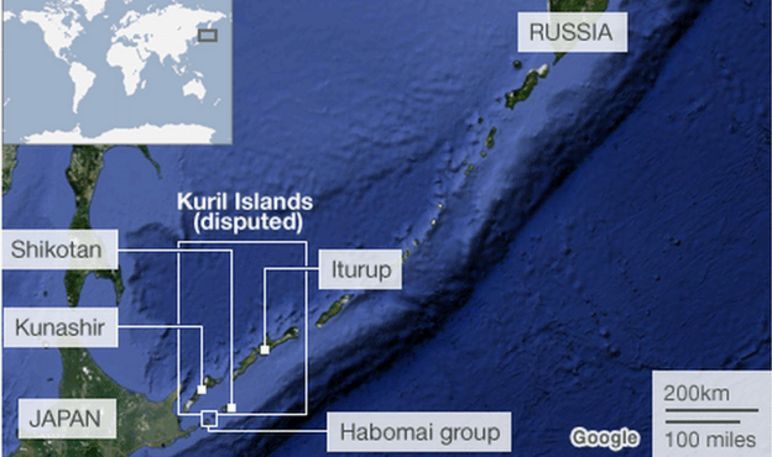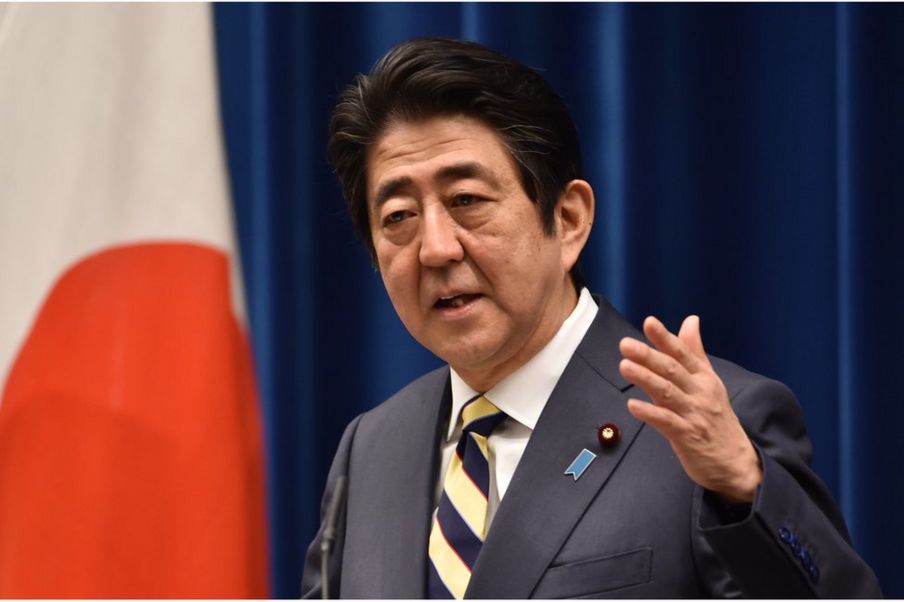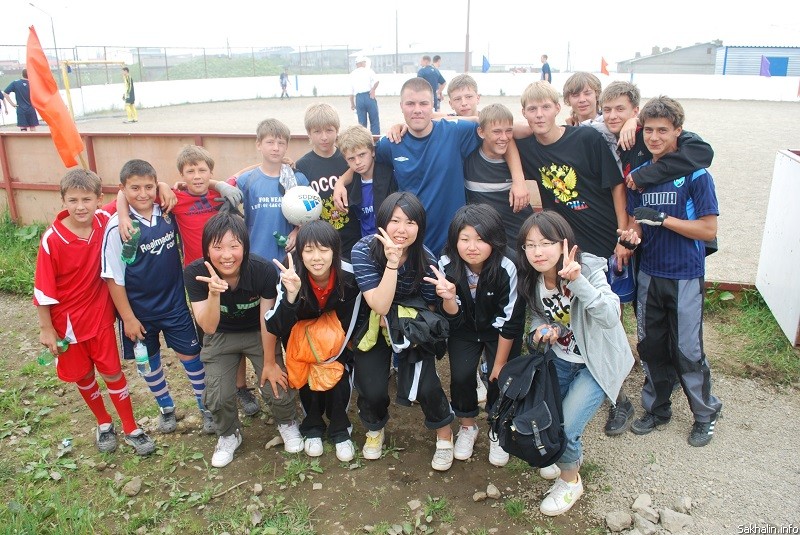|
|
Post by Admin on Sept 22, 2015 20:09:45 GMT
 Russia says it is ready for more talks with Japan on a long-delayed peace treaty, but there is no room for compromise over the two countries' territorial dispute. Foreign Minister Sergei Lavrov made the comments after talks with his Japanese counterpart, Fumio Kishida, in Moscow on September 21. A dispute over the Kuril Islands, which Russia seized from Japan at the end of World War II, has strained ties and has kept the two countries from signing a peace treaty. "On our agenda is reaching the peace deal," Lavrov said. "Moving forward on this issue is possible only after we see clearly Japan's recognition of historical realities." The two ministers agreed to hold bilateral consultations on a peace treaty next month. They also discussed a long-delayed visit by President Vladimir Putin to Japan. Lavrov said the Kremlin had accepted the invitation, but that the specific date was up to Tokyo. |
|
|
|
Post by Admin on Sept 24, 2015 20:22:32 GMT
Moscow and Tokyo have been locked in a territorial dispute for more than a century over the Kuril Islands, which extend in a chain between the two countries. The islands have changed hands repeatedly throughout history, though after World War II the Soviets occupied the disputed islands and expelled their Japanese inhabitants. Because Japan sees Russia as an occupying force in the Kurils, Moscow and Tokyo have never signed a peace treaty to end their World War II hostilities. Since that time, Russia has viewed Japan as part of the U.S. alliance structure. The two countries have had a relatively poor relationship and fairly low levels of trade. But in recent years, both countries' circumstances have changed, leaving the two to explore a possible end to the dispute and a warming of relations. First, Japan's energy consumption patterns shifted after the Fukushima Daiichi nuclear disaster in 2011. The change occurred just over a year after Russia began exporting more oil eastward and made plans to begin constructing natural gas pipelines.  In 2013, the countries also discussed two major investment deals: a Russo-Japanese investment bank that would help the Russian state privatize assets, and Japanese investment into Russia's energy sector, particularly Gazprom's East Siberia fields and a possible liquefied natural gas facility at Vladivostok. The deals would be the first major investments between Tokyo and Moscow outside of the Sakhalin-2 LNG facility, which is located on an island Japan technically still considers its territory. These opportunities led Moscow and Tokyo to explore a possible deal over the Kuril Islands in 2013, which proposed that Russia give two of the islands to Japan and promise to return the other two islands within the following decade. The thaw in Russo-Japanese relations halted after the 2014 uprising that replaced the pro-Russian government in Ukraine with a Western-backed government. Western sanctions against Russia followed, and Russia grew more internationally isolated. Russia likely would have continued pursuing stronger ties with Japan if Tokyo had not signed onto the sanctions against Russia and spoken out against the Russian annexation of Crimea. In May, Russian Duma Speaker Sergei Naryshkin said Japanese officials had indicated that the United States had pressured Japan into joining the sanctions.  Since then, Russia has increased its military activities in the Pacific, conducting military flights around Japan's northern islands and holding exercises on the disputed Kuril Islands. Over the summer, a series of Russian politicians and officials visited the islands. The Japanese government launched formal protests against Russian Prime Minister Dmitri Medvedev's visit in August. The Russian government has backtracked on negotiating and even changed its tone concerning the islands. Lavrov stated Sept. 22, "No progress can be made without a clear understanding of the historical facts as a result of World War II," meaning the Russian government now wants Japan to recognize that the Kuril Islands belong to Russia. Because of Moscow's new stipulation, Lavrov admitted that he and his Japanese counterpart would not even discuss the islands. This makes any settlement on the issue highly unlikely in the foreseeable future. For Russia to agree to give the islands back to Japan, Moscow would have to recognize the islands as Japanese. Having recently annexed Crimea, Russia does not want to show either its domestic audience or the international community that it is willing to cede territory if pressured. However, this does not mean that Russia and Japan do not need high-level dialogue. The countries have agreed to resume their 2+2 talks, a mechanism through which their foreign and defense ministers meet regularly. Both countries are involved in and see increased military activities in the Pacific. Russia, however, is wary that Japan — a key U.S. ally — could be part of Washington's policy of containing Russia. But Japan also does not want to see relations between Moscow and Beijing grow into a force that could act as an axis against Washington and Tokyo. Russia, meanwhile, does not want to base its eastern strategy on China and would like to have multiple East Asian customers for its energy exports. Russia also wants to separate the territorial dispute from Japanese firms investing in Russia, something Japanese businesses are keen to do. However, for Japanese companies to flood Russia's energy sector with their advanced technology, Tokyo will have to wait for the sanctions on Russia to be lifted. Japan has shown that it will not work against U.S. wishes concerning Russia. Moscow is hoping to create an atmosphere over the next few years that will lead to the lifting of sanctions, so now is the time for Russia to resume talks with Japan in hope of warming bilateral ties again in the years to come. |
|
|
|
Post by Admin on Jan 6, 2016 19:32:55 GMT
 Japan's Prime Minister Shinzo Abe has called for talks with Russia's President Vladimir Putin so that the two countries can negotiate a peace treaty. The two never signed a treaty after the end of World War Two because of a dispute over four islands.  Mr Abe told reporters that both leaders recognised that the lack of such a document for 70 years was "abnormal". Since taking office in 2012 Mr Abe has tried to improve relations with Moscow. The former Soviet Union had seized several islands which Japan calls its Northern Territories in 1945. Russia calls them the Southern Kurils. Mr Abe told reporters at his New Year press conference in Tokyo that he and Mr Putin "share the view that it is abnormal" for their countries not to have a peace treaty. The two countries established diplomatic relations in 1956. "But without a summit meeting this Northern Territories problem cannot be resolved,'' he said. He added that he would continue discussions with Mr Putin "when opportunities arise". |
|
|
|
Post by Admin on Jan 27, 2016 19:38:02 GMT
Russia is inviting foreign partners to help it develop fisheries around Pacific islands where Moscow and Tokyo have rival territorial claims and says it will give Tokyo priority; but if it doesn't jump at the chance, other investors will. President Vladimir Putin's special envoy for Russia's Far Eastern region Yuri Trutnev said the offer was part of a broader plan to develop a huge territory rich in resources but poorly developed and lacking infrastructure from roads and labor to communications. A farming project with China was also proposed.  Disputes over the islands known as the Kuriles in Russia and the Northern Territories in Japan have strained relations between the two countries since World War Two, when Soviet forces occupied four of them at the southern end of the chain. Moscow has angered Tokyo in recent years by having state officials visit the islands, situated seven time zones from the Russian capital, and stepping up military activities there. Japan says the islands are part of its territory, lying at their southernmost reach less than 20 Km (12 miles) from Hokkaido.  "We want to develop the Kuriles at a brisk pace," Russian Deputy Prime Minister Trutnev told Reuters on the sidelines of the World Economic Forum in Davos. "The conditions are ideal there for fishing and fish farming. So we are inviting Japanese companies, and are ready to give them priority in joint ventures ..." |
|
|
|
Post by Admin on Apr 14, 2016 19:14:21 GMT
 The four Kuril Islands — Iturup, Kunashir, Shikotan and Habomai — have been administered by Russia since the end of World War II, but Japan still lays claim to them. "The peace treaty issue cannot be reduced to some territorial matters or territorial claims, at the very least because the only document that was signed and ratified by both sides — the joint declaration of 1956 — states that the sides have agreed to renounce all claims against each other, and the next task is to sign a peace treaty," Lavrov said in an interview with Chinese, Japanese and Mongolian media. He also said that disapproving statements coming from Washington regarding high-level contacts between Russia and Japan are simply outrageous.  "We have heard statements from Washington that they do not approve of high-level contacts between Russia and Japan…this is outrageous behavior. I think our Japanese colleagues understand this and assess it in a way such unacceptable manners should be assessed." |
|